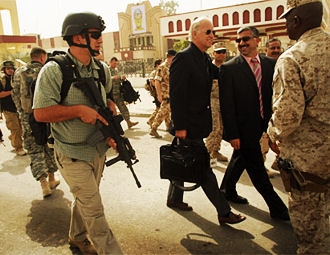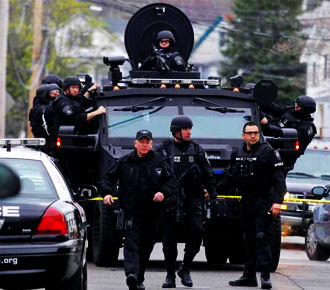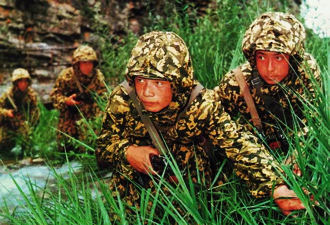Soldiers of Fortune: The Private Military Industry after the Global War On Terror
The protracted brushfire wars of the early 21st century led to the re-invention of an ancient warfare phenomenon: Mercenary operations. Although technically illegal according to the UN Mercenary Convention that became active in 2001, the so-called 'private military companies' exploited legal loopholes and semantics to operate within the grey areas of international law. As the violent insurgencies in Afghanistan and Iraq dragged on and the Western public grew increasingly weary of these hopeless wars in failed states, the PMCs stepped in, providing their training expertise to the local militaries as well as security assistance during the withdrawal of foreign troops. Many of the contractors were former soldiers themselves, but their lack of legal accountability and occasionally loose interpretation of the rules of engagement led to a number of violent incidents which tainted the image of PMCs in the public perception. As a result, the global PMC market remained highly contested, but limited in scale and scope.

A contractor provides security in Baghdad, 2010
As with so many things, that all changed with the end of the Global War On Terror in 2028: After US President Howard Paulson had initiated a hard reset on America's foreign policies with what he dubbed the 'Zero Hour' in one of his landmark speeches, the US military was subjected to the most drastic, unforgiving cuts in its entire history. With an overflowing budget far in excess of one trillion dollars per year, the federal government reduced the number of active troops to just slightly over a million, eviscerated large parts of the US Army and Navy and halted the procurement of several new weapon systems including the ill-famed F-35 joint strike fighter.
America's military-industrial complex buckled under these drastic measures. Starting with the nuclear attack on Beijing in 2019, the Global War On Terror raged on for an entire decade and the GLA provided an ideal enemy, seemingly devoid of any morality and restraint, for both the West and the East to project their hatred upon. Fuelled by populist rhetorics about a supposed 'clash of civilisations' between the forces of capitalist democracy and medieval fundamentalism, America's fighting spirit remained strong throughout the first half of the decade. The 2020s turned out to be a veritable gold rush for arms manufacturers around the world but all of that had come to a sudden stop when the GLA's unbroken fanaticism and escalating use of bio-chemical weapons led to ever rising casualty rates which had a highly demoralising effect on the American homefront. President Paulson's Zero Hour marked the point at which the 'war bubble' collapsed - and with it, a large portion of the US economy.
Millions of Americans, including hundreds of thousands of former soldiers, were left without employment during the depression that followed. The federal government also took its hatchet to healthcare and social security which, although understandable from a strictly fiscal point of view, only added more fuel to the fire of societal unrest. Many retired servicemen and women who returned from the war-torn regions of the world with permanent physical injuries and psychological trauma could only watch helplessly as their savings and compensations melted away along with their hopes for a secure and peaceful life after the war that scarred their generation. The population rallied in protest and violence spread across the country to the point where martial law was declared in the most heavily affected cities and counties.
Many of the veterans became overtly political and spoke out against the failure of America's leadership. Others took a more entrepreneurial approach to get out of their misery: The scaling-down of the armed forces resulted in a massive influx of well trained and combat experienced personnel for the private military companies, the biggest of which, Red River Security Solutions International, was based in America. The company once started out as a security firm under the leadership of a former Green Beret and made international headlines in the early 2020s when the authorities of multiple bankrupt municipalities, most prominently Detroit, abolished their own police departments and issued their law enforcement duties to Red River in an effort to reduce costs.

Red River enforcers secure a scene in Detroit
While the American homeland itself practically disappeared from the global political stage for a few years following Zero Hour, the PMCs gladly filled the void and expanded their operations considerably. Military-grade hardware, including armoured vehicles, aircraft and even ships were sold en masse and the Military Surplus Economization Act of 2030 allowed US-based PMCs to purchase and operate such advanced machinery under the sole condition that the partaking companies would never accept a deal from a foreign client in which they would stand against American civilians or military personnel. Fellow American contractors in service of other companies were conspicuously omitted by this clause.
By the middle of the decade, the Mercenary Convention was practically rendered meaningless due to the ineffectuality of the UN. If national jurisdictions in one of the few ratifying countries forbid the creation of a local PMC, the only consequence was the loss of a potential market and tax revenue, for the company could simply settle in another nearby country. The reality of warfare in the 2030s had superseded the intentions of the lawmakers to the point where PMCs even started taking part in conventional combat operations. Most companies adopted military-style rank structures and even uniforms and insignia. As a result, their employees are practically regarded as regular combatants as long as their operational mandate is legally stipulated with their client state. The typical services of most PMCs include training, intelligence, logistics and protection, but there are bigger companies which are capable of mounting combined arms assaults, airborne or amphibious landings, maritime patrols and even covert operations on a limited scale for the right price. Market leader Red River even operates its own information subsidiary, Vanguard Media, which is in charge of the company's public relations, advertising and sponsorship programmes, social network activities and even embeds its own reporters right alongside the contractors while selling the rights to their footage and reports to news agencies.
While there is no PMC with enough manpower, equipment or capital to rival a full-fledged state actor in a prolonged campaign, their specialist contributions have already made a difference in several low-intensity conflicts around the globe. By the early 2040s, Africa became the primary market for PMC services, with Red River and other Western companies operating in support of the local militaries in the south and east after the Russian retreat. Red River's primary competitor sits right on the other side of the GLA-controlled territories that split the continent in two: Art of War Consulting & Services LC is a Hongkong-based enterprise that provides training assistance, asset protection and direct action support to the governments of Egypt, North Sudan and Ethiopia, which allied themselves with the Chinese after the People's Liberation Army put a violent end to the pirate hideouts in Somalia, Djibouti and Eritrea. While somewhat lacking the finesse of Red River, AoW enjoys the benefits of a strong relationship with the Chinese government and commands a much larger amount of manpower, including some highly experienced contractors from China, various central Asian countries and even ex-KPA personnel from what used to be North Korea.

An AoW special recon team operates inside The Zone
The sudden outbreak of the Russo-European War in 2045 has, perhaps somewhat surprisingly, put a damper on the growth of the PMC market. This might be due to the fact that many European leaders have repeatedly accused some of the smaller, less 'polished' companies of illegal activities, ranging from fraud, corruption and tax evasion to human trafficking, illegal arms deals and drug trade. Russian President Suvorov on the other hand has outright condemned the entire PMC industry as a 'cynical commercialisation of human misery' and labelled the contractors as 'vultures without any honour, loyalty or principles who whore themselves out to causes they neither understand nor believe in for the filthy lucre'. It remains to be seen how the outcome of this new war, whatever it may be, will affect the industry - whether peace, order and the power of international law will be restored or whether there is going to be a new vacuum to be filled by the merchants of war.
